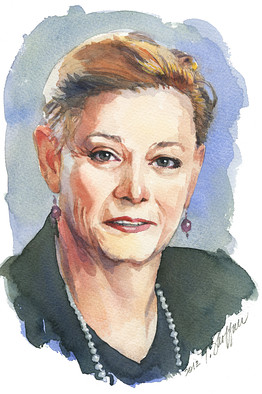Liberty Matters
Skyscrapers, Wrecking Balls, and Gumption
 In their eloquent responses to my lead essay, both Joel Mokyr and John Nye say little with which I disagree. (My apologies to readers who are hoping for a tense, take-no-prisoners intellectual ink-bath.) The only claims worth disputing with any vigor are Joel's charges that Deirdre, in explaining the industrial revolution, "rejects the notion that 'institutions' mattered," and that I accept such a rejection of the significance of institutions.
In their eloquent responses to my lead essay, both Joel Mokyr and John Nye say little with which I disagree. (My apologies to readers who are hoping for a tense, take-no-prisoners intellectual ink-bath.) The only claims worth disputing with any vigor are Joel's charges that Deirdre, in explaining the industrial revolution, "rejects the notion that 'institutions' mattered," and that I accept such a rejection of the significance of institutions.Because Deirdre is actively participating in his forum, I'll let her speak for herself. Yet I have never interpreted her as denying the significance of institutions or as jettisoning institutional analyses. But even if I profoundly misread Deirdre, I know for certain that I myself emphatically believe that institutions matter, and matter a lot. Fulsome and widespread respect for merchants, entrepreneurs, and innovators will yield nothing if too many formidable predators are on the prowl. Ditto if too many respected elders or officials have the power and interest to thwart progress or to attempt to channel economic activities in certain favored directions and away from disfavored ones.
Of course, ideas about predation and political interventions affect the extent and frequency of such activities – but so, too, do institutions. For example, a formal constitution that fragments political power can stand as an obstacle to the dangerous concentration of such power. Likewise, a formal or even informal arrangement that gives different courts overlapping jurisdiction with each other can serve as a check against judicial corruption and as a competitive spur to productive innovations in formal legal proceedings.
Pro-bourgeois, innovation-friendly ideas require tolerably fertile institutional soil in which to take root and bear fruit. They cannot spark and sustain mass flourishing on their own.
Changing analogies: I often think of ideas, skills, individual initiative, and creativity as the actual activities that construct skyscrapers of prosperity, and bad institutions as powerful wrecking balls that knock these skyscrapers down whenever they begin to rise. Obviously, as long as such wrecking balls swing in the direction of rising skyscrapers, no skyscraper will be built, regardless of the gumption and learning of architects and construction workers. And eventually, even the most ambitious and hopeful architects and construction workers will stop even trying to build skyscrapers. Why bother?
Given human nature – that is, given that humans are self-interested, incurably ignorant of many relevant details of any situation, and prone to irrationality, myopia, and envy – the prevalence of such wrecking balls is likely a default reality. The specific institutional manifestations of such a default reality vary over space and time, but in all cases they discourage large accumulations of capital, robust innovation, and economic change. Pro-growth institutions, therefore, are those that penalize or otherwise raise the costs of predatory behavior. These institutions take us human beings as we are – warts and all – and change, not us, but the material incentives that we face. They manage to temper our ability to swing wrecking balls.
But again, while growth cannot occur if wrecking balls swing, the absence of swinging wrecking balls – that is, the presence of good institutions – is not sufficient to make growth happen. Personal characteristics such as gumption, risk-taking, and tolerance for the material successes of others are necessary to rouse individuals actually to do what must be done to create widespread prosperity. Admiration and applause for these and other bourgeois virtues supplies the missing ingredients for growth.
John Nye, of course, is correct. More hard-headed analyses must be done to clarify important details. Exactly what sort of ideas matter most? Are some people's ideas generally more influential than other people's ideas? (Hayek, for one, said yes: the expressed ideas of intellectuals – that is, the ideas expressed by "secondhand dealers in ideas" – are especially important. [25])
And is there a relevant difference between the ideas that people consciously hold and the ideas that actually govern people's behaviors? Deirdre (I think) would say that the former governs the latter. But maybe the relationship between ideas consciously held and expressed and the ideas that actually fuel and steer human actions is more complex than a simple one-direction causal chain from "ideas expressed" to "ideas consciously held" to "ideas that govern human actions." (If there is such greater complexity, we might here have a clue to why the still-poor Filipinos express greater enthusiasm for free markets than do the long-rich Americans.) And what is the role of time in nurturing ideas and in transforming those ideas into mass flourishing?
Yes. Much more serious, careful research and thinking must be done (and always with minds as scientifically skeptical as humanly possible). Fortunately, not only do the norms of scientific inquiry today prompt such painstaking further inquiry, so, too, do the institutions of scientific inquiry.
Endnotes
Copyright and Fair Use Statement
“Liberty Matters” is the copyright of Liberty Fund, Inc. This material is put on line to further the educational goals of Liberty Fund, Inc. These essays and responses may be quoted and otherwise used under “fair use” provisions for educational and academic purposes. To reprint these essays in course booklets requires the prior permission of Liberty Fund, Inc. Please contact oll@libertyfund.org if you have any questions.